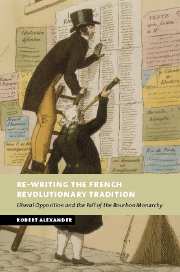 Re-Writing the French Revolutionary Tradition
Re-Writing the French Revolutionary Tradition Book contents
- Frontmatter
- Contents
- List of maps
- List of tables
- Acknowledgements
- List of abbreviations used in notes
- Map 1 The departments of France and their capitals in 1814
- Map 2 The Haute-Garonne
- Map 3 The Isère
- Map 4 The Bas-Rhin
- Map 5 The Seine-Inférieure
- Introduction: Open questions
- 1 False starts and uncertain beginnings: from the First Restoration (May 1814) to the elections of September 1816
- 2 Battle commences: from September 1816 to July 1820
- 3 Self-defeating opposition: from July 1820 to February 1824
- 4 Back on track: from March 1824 to January 1828
- 5 Towards victory?: from January 1828 to July 1830
- 6 Aftermath: Liberal Opposition and the July Revolution
- Conclusion: Revolutionary tradition
- Bibliography
- Index
- NEW STUDIES IN EUROPEAN HISTORY
Introduction: Open questions
Published online by Cambridge University Press: 04 December 2009
- Frontmatter
- Contents
- List of maps
- List of tables
- Acknowledgements
- List of abbreviations used in notes
- Map 1 The departments of France and their capitals in 1814
- Map 2 The Haute-Garonne
- Map 3 The Isère
- Map 4 The Bas-Rhin
- Map 5 The Seine-Inférieure
- Introduction: Open questions
- 1 False starts and uncertain beginnings: from the First Restoration (May 1814) to the elections of September 1816
- 2 Battle commences: from September 1816 to July 1820
- 3 Self-defeating opposition: from July 1820 to February 1824
- 4 Back on track: from March 1824 to January 1828
- 5 Towards victory?: from January 1828 to July 1830
- 6 Aftermath: Liberal Opposition and the July Revolution
- Conclusion: Revolutionary tradition
- Bibliography
- Index
- NEW STUDIES IN EUROPEAN HISTORY
Summary
An experiment in government – such was how contemporaries viewed the Bourbon Restoration, according to Charles de Rémusat. Although partisan, Rémusat's observation was nevertheless insightful. For many, the political system established in 1814 was not necessarily definitive; it could be subjected to alteration, minor or major, and ultimately the public would decide whether the experiment was a success or failure.
The chief embodiment of the Restoration experiment was the Charter of 1814, a constitution wherein elements of the changes brought to society and polity after 1789 were blended with elements of the ancien régime. Implementing the new constitution thus entailed, at least in part, putting into practice the ideals of the Revolution in an enduring and stable fashion. Yet, as the Charter was drawn up in haste, with many details left for subsequent elaboration, it was natural to look upon the new constitution as at most a blueprint.
In many regards the Charter was ambiguous, leaving much open to interpretation. Given the fragility of the new regime, ambiguity served a certain purpose in that it allowed various groups to view the regime differently, but still give their approval. From its origins, however, the Charter was interpreted in two fundamentally different ways. For royalists, the constitution was entirely a product of royal sovereignty – it was granted by Louis XVIII of his own free will. For those who came to oppose this interpretation, the Charter was a contract between the monarch and the nation.
- Type
- Chapter
- Information
- Re-Writing the French Revolutionary TraditionLiberal Opposition and the Fall of the Bourbon Monarchy, pp. 1 - 29Publisher: Cambridge University PressPrint publication year: 2003


